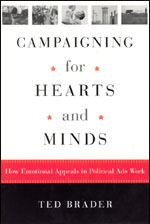Campaigning for Hearts and Minds: an excerpt
 It is common knowledge that televised political ads are meant to appeal to voters’ emotions, yet little is known about how or if these tactics actually work. Ted Brader’s innovative Campaigning for Hearts and Minds: How Emotional Appeals in Political Ads Work is the first scientific study to examine the effects that these emotional appeals in political advertising have on voter decision-making.
It is common knowledge that televised political ads are meant to appeal to voters’ emotions, yet little is known about how or if these tactics actually work. Ted Brader’s innovative Campaigning for Hearts and Minds: How Emotional Appeals in Political Ads Work is the first scientific study to examine the effects that these emotional appeals in political advertising have on voter decision-making.
The February 2006 issue of Public Opinion Pros features an excerpt from Campaigning for Hearts and Minds titled "Emotion and the Persuasive Power of Campaign Ads." From the excerpt:
Fear plays a particularly decisive role in the process of persuasion. Appeals to fear, cued with harsh images and music, help to pry open the door to attitude change and unexpected choices. Fear does not guarantee a change of mind but, relative to either enthusiasm or less emotional appeals, it offers the best shot at doing so… Fear ads can win converts or create uncertainty among those who were initially opposed, but they do not achieve this entirely or even mainly by increasing acceptance of the ad’s message. The ads instead cause viewers to place less weight on prior preferences or ideology and more weight on contemporary assessments of the issue and character strengths of the candidates or their gut reactions to the campaign message. We see something similar for capturing the attention of viewers. Fear ads do not improve general recall of the ad or name recognition of the candidates, but they do motivate citizens to pay greater attention to related information in the news and to seek out more such information from political and nonpolitical sources. In most cases, these ads are especially effective on those who prefer the opposing candidate and those who are most knowledgeable about politics.…
Read the rest of the excerpt.